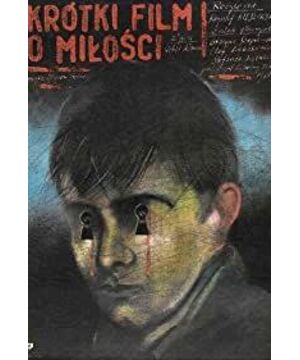If we pay attention to the perspective of the movie, it will be easy to find Kijeslovsky's deliberate design. The story is almost always unfolded from the perspective of the loved one, not the loved one. And before and after the transition, which happened in two-thirds of the story, the loved one is also in the ignorance of love. After Zamik expressed his feelings, their camera time together was only about ten minutes, and the story time was limited to a few hours at night. Magda's love has long been buried in indifference, born after Zamik left. Of course, according to Kijeslovsky’s own statement, “it was sympathy at the beginning, then it may be condemnation of conscience, and then it may be love.”
Therefore, the division of structure and the setting of perspective allow many dramatic effects to be achieved. Through Zamik's peeping lens, we saw a woman lost in sexual desire. Her career, her family, and her love story were overwhelmed by the world outside the lens. Zamik spent a year capturing the growing sorrow of the love object. She was written as an imperfect incarnation of love by the language of the camera. Compared with the depiction of Magda’s self-image, this writing serves to the same extent as a reverse footnote to our understanding of Zamik as an angel of failure.
The term angel of failure was used by George Steiner to describe a typical character in Dostoyevsky's works. Among these diverse characters, Zamik's purity is easily reminiscent of the similar Myshkin in "Idiot." In Dostoyevsky's notes on the novel, Myshkin's other name is Jesus, and it is in this sense that Dostoyevsky bestows moral purity on this character. This morality is directly linked to his incompetence in love in the novel. If we look at the film through the novel in this sense, Zamik can also be endowed with a noble aura-he possesses the purity of love and is powerless to moral restraint. Stealing, peeping, and intercepting letters, moral constraints have been completely squeezed out by the purity of love.
In addition, by investigating Zamik's life, we returned to Dostoevsky in the "Angel of Failure". Zamik's loneliness, his taciturnity, a separate room, and the postman's ignorance of Zamik's name, these elements constitute one of Dostoevsky's themes-underground people. In "The Notes of the Underground" and "Crime and Punishment", the protagonist degenerates surrounded by this kind of life. It is this accompanying contrast that helps us better understand Zamik. He did not degenerate, because compared with the underground people and Raskolnikov's loss of faith, Zamik firmly believed in the "imagined" in love. Underground people cannot extricate themselves in denial, while Zamik indulges in the flow of time in the affirmation of love.
Until they met, the angel was eventually led to "failure." Before that, Zamik's angelic qualities really moved us. When Magda asked Zamik teasingly about her desires-a kiss, a trip together, or sex-Zamik said "no" very sincerely. He said he wanted to invite Magda to eat ice cream. The possible danger of this scene is obvious: Today, when the angels are disenchanted, the audience is likely to feel ridiculous and false at first, and then ridicule them. But Kieslowski rejected this danger with the seriousness of the film. This seriousness undoubtedly borrows the eternal sublime of love.
The subsequent development of the story shows the ancient paradox of love and sex. The purity of the spirit was ruthlessly shattered in Magda's playful attitude, in her direct equating of love and sexual desire, especially in the cruelty of her last sentence. Zamik's final suicide is easily reminiscent of the cruel aesthetics of Mishima Yukio. Of course, Yukio Mishima also committed suicide in the end. The same tragic nature of the two allows us to see the aesthetic logic permeated: when the purity of beauty is tarnished, only decisive death can achieve a certain sense of redemption.
As the last and strongest stimulus, Zamik's suicide completely awakened Magda's numb love bud. The structure of the film was also reversed at this time. The observer was changed from Zamic to Magda, and the loved one was also unaware of the gaze of another space. But everything has changed. What is shown in the lens is no longer another person's life, but a window that is always in the dark. This seems to indicate that something has disappeared. At Zamic’s residence, further contact between the two was stopped.
However, as a master, Kieslowski designed this intriguing ending: through the lens that has been peeping at herself, Magda successfully "discovered" herself. In this way, the other side of love has also achieved salvation. In the milky flow of milk, she saw a kind of pure spiritual power.
View more about A Short Film About Love reviews








